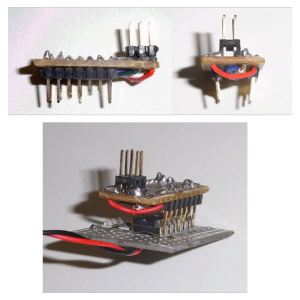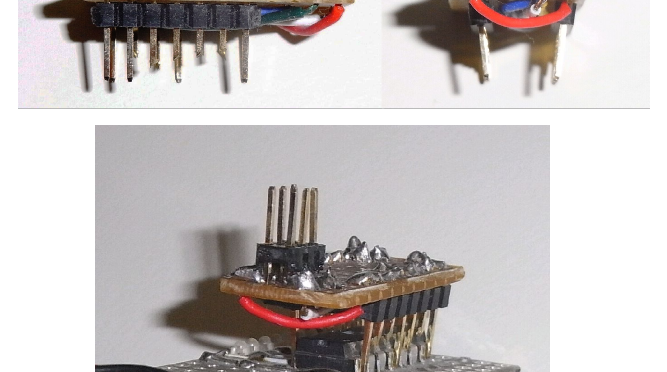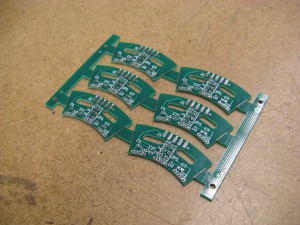scale of 50 yoyos. project will be working on over the next month by dan fourie, laura shumaker, and I as a for-fun project spawned out of an idea my for-grades 2.008 team passed over.
functional parameters:
yoyo with integrated persistence-of-vision display
design parameters:
as of right now, for each side:
- 5 LED display, similar to (josh gordonson and zach banks, fellow mit students) earlier work:
 |
| http://olopede.com/media/img/micropov-hand.JPG |
- Resolution would therefore look like
http://olopede.com/media/img/pov-1.JPG - Goals: user-friendly and mod-friendly
- Two buttons, high enough that can be accessed by pressing down on the clear thermoformed plastic cover over the circuitboard (similar to plastic water bottle in feel)
- on/off power button(decided against the centrifugal switch designed by paulina mustafa, another classsmate, for their iron man arc reactor yoyo, because gives user option to operate pov-display without spinning the yoyo for a more stable display)
- “change text displayed” button, and you can change the display by holding it up to your monitor ala http://fab.cba.mit.edu/classes/4.140/people/robert.hemsley/week8.html. This method means the user doesn’t need to have special cables to change the displayed text, and we don’t need a complicated / non-intuitive button interface.
- if we order pcbs, can have holes for people to stick FTDI or ISP headers in, so people don’t need to solder little wires straight to the microcontroller if they want to edit or update the firmware on the ucontroller (or make a clamp breadboard) or buy one of the clamp programmers
- can have another mode (hold down button longer?) to change the flicker rate, since we’ll be using internal microcontroller clock which is RC and due to manufacturing variability only accurate to +- 10%
- discarded option: right-angle button which sticks out side of yoyo. more complicated injection molds and I was worried if it’d be structural enough, since solder joints would be taking the strain. Seemed most likely to fail after repeated use.
- PCB should snap fit in, so people can mill their own pcb’s and swap out the pcb if wanted
- Rectangular PCB should fit, so it’s easier to panelize and easier for people to make their own board (can etch and shear off one side instead of having to have a mill and mill a circular board, although circular boards look cool .___.)
- Ideally PCB is single-sided
- run off a 3v button cell and contain a spare so people can go longer without ordering their own.
- pcb serves as cell-holder, batteries should snap fit in to further simplify mechanical design
- TODO not sure how batteries will be electrically connected to the board
- for changing the battery / updating the firmware, top half of each side will be removable via a notch on the side
- assembly: teach a microcontroller series and have people assemble two and keep one?
 |
| http://tomscircuits.blogspot.com/2009/04/micro-pov.html |
 |
| http://parts.digikey.com/1/parts/389604-8-pin-test-clip-alloy-soic-15-923650-08.html 8pin: $14, 14pin: $17 |
–maybe have a fourth state changing the flicker rate, in case a specific microcontroller’s clock is off (on/off/text programming/flickr rate programming)
cost estimate:
$4.30 for two attiny85’s off of digikey, + shipping. || $2.96 for each attiny88 ($6).
cheap power-hungry LED, well.
- http://fab.cba.mit.edu/about/fab/inv.html 60-1167-1-ND LED RED CLEAR 1206 SMD: 100mW, too dim to see PoV well @ room lighting once flickering ala tomscircuits.blogspot.com/2009/06/nano-pov.html — this is somewhere from 2.8 to 10 mcd @ 10mA (100mW power dissipation)
- http://www.ebay.com/itm/300p-SMD-SMT-0805-Bright-RED-LED-Lamp-Light-800mcd-/350361925519?pt=LH_DefaultDomain_0&hash=item519332b78f#ht_3749wt_1396: $25 for 300. 800 mcd, 100mW. So, $50 for 600 incl. shipping — 12c each, or:
$1.20 per yoyo for 10 LEDs (five on a side), shipping incl.
(http://scolton.blogspot.com/2011/10/strobe-attack.html) cost ~$50 + shipping for 12 of them off of myropcb. Ladyada has a cost calculator for multiple suppliers and comments for each supplier: http://www.ladyada.net/library/pcb/costcalc.html
That’s like $12 for each yoyo.
So uh… Maybe instead I will sink $80 into buying my own 1/64” and 1/32” spindles for the modela (each good for ~50 boards).
$2 per yoyo
ebay: $25 for 3x 9” by 12” FR4 board. Est.: our boards max 2” diam, so 1.5” square is 6×8 = 48 boards. So maybe $50 for 96 boards, or about
$1 copperclad per yoyo
Buttons:
75c ea @ 100 off of digikey. http://search.digikey.com/us/en/products/B3SN-3112P/SW262CT-ND/60835 (need 200). or ebay, 100 for $7 incl shipping. $14 / 50 = 30c per yoyo. but late shipping…! may be too late for the semester
$3 per yoyo.
phototransistor: 28c each @ 100.
$1.20 per yoyo.
10k resistor, 50kohm, 5x zero ohm, 4x 500 ohm, 1uF cap.
14c each @ 100, cap http://search.digikey.com/us/en/products/C3216X7R1H105K/445-1423-1-ND/569089
0.017 @ 100, 10k, 50k http://search.digikey.com/us/en/products/RC1206FR-0710KL/311-10.0KFRCT-ND/731430 http://search.digikey.com/us/en/products/RC1206FR-0749K9L/311-49.9KFRCT-ND/731890
0.01292 @ 250, total 400 needed, 500ohm http://search.digikey.com/us/en/products/RC1206FR-07499RL/311-499FRCT-ND/731891
total 500 needed
0.00676 @ 500, total 500 needed, zero ohm
(this is if pov circuit does NOT need any resistors etc. ala , these are all for voxel light-programming) http://fab.cba.mit.edu/classes/4.140/people/robert.hemsley/week8.html
total = .14*2 + 0.017*6 + 0.013*4 + 0.007*5 = 0.469
About 50c per yoyo. these are all 1206 packaging!
CR927, 4 batteries each, 200 total: $22 http://www.ebay.com/itm/200-CR927-DL927-LM927-ECR927-KCR927-927-Cell-Battery-E2-/180756330972?pt=US_Batteries&hash=item2a15eab9dc#ht_2063wt_1163, 30 mAh, used in blinkies
44c ea. yoyo
(alternative: rechargeable ones, $1.44 ea 55 mAh TINY 6.8mm diam http://octopart.com/ms621fe-fl11e-seiko-8119587, with solder tabs: $1.29 ea 48mAh 12 mm diam http://octopart.com/br1225-1vc-panasonic-155413, $1.71 550mAh 23 mm diam http://octopart.com/cr-2354%2Fgun-panasonic-13183344
octopart search: http://octopart.com/partsearch/#search/requestData&q=lithium+battery&rangedfilters%5Boutput_voltage%5D%5Bmin%5D=1.5&rangedfilters%5Boutput_voltage%5D%5Bmax%5D=4.9945883802956885&rangedfilters%5Bavg_price%5D%5Bmin%5D=0.24250000000000002&rangedfilters%5Bavg_price%5D%5Bmax%5D=1.8412916540799584&start=10)
accelerometers 0.67 ea @ 100, http://search.digikey.com/us/en/products/MMA7660FCT/MMA7660FCT-ND/2186165, as used by
Indeed mill-able on the modela — http://www.freescale.com/files/sensors/doc/data_sheet/MMA7660FC.pdf 0.5mm gap, 0.3mm pad — DFN package
25 mil pins (15.6 mil gap and 10 mil pad/trace) — for modella, can achieve. aka 0.398 mm gap / 0.254 mm pad
$1.40 per yoyo
total: $15 per yoyo + some digikey shipping costs, so close to $17 each if we count the aluminum molds and injection molding / thermoforming raw mats as free (due to 2.008). and of course free labor XD
=====
Previous research:
LEDs
If we use those super-efficient LEDs, they are 30c each if we buy 400 (50 yoyos * 8 = 400 LEDs).
(http://www.newark.com/jsp/search/productdetail.jsp?SKU=38K3409&CMP=AFC-OP&CMP=AFC-OP via http://octopart.com/partsearch/#search/requestData&q=Kingbright%20KPTD-3216SURC)
x8 = $3 (if we include shipping)
Total = $118 + $10 shipping (so upward bound of $130)
So, about $2.60 per yoyo
if we want them (I don’t think we do, we should design this into our mold or PCB) holders would be $1.50 each http://octopart.com/partsearch/#search/requestData&q=cr2032
Microcontroller ~$1.50 each http://octopart.com/partsearch/#search/requestData&q=attiny25, maybe $10 for shipping, aka $1.70 per yoyo
Here is how the “spin-activation” would work:
http://cdn.makezine.com/make/2010/06/WP105LEDYo-Yo.pdf
So, at 50 yoyo’s, we’re looking at $6 each which is over our budget. However, I’m confident if we look a bit harder we can get the prices down to $5 each.
=====
Thursday: [everyone] finish the CAD for the molds
Friday: [nancy] check the dims / tolerances with Pat and Dave
Then CAM over the weekend Saturday, say meet for dinner on putz @ 5pm and then CAM (putzgiving is Sunday). Order electrical parts.
Hopefully mill / turn the molds over Mon – Wed before thanksgiving.
Finish electrical design -> gerber and programming over thanksgiving break and order pcbs if ordering them. by 26th
And injection mold / thermoform the week after (done by Friday December 2nd).
Assembly done by Dec 9th.
=====
PoV no accelerometer notes:
I got nanopov example working this weekend — no accelerometer indeed means there’s an optimum speed the display wants to be waved at. wave it too fast and the image gets stretched out, too slow and the whole image isn’t displayed or it’s super-squished.
Oh, Tom went over this in his blog post:
One downside of this design is that there is no synchronisation between movement of the display and the display output. So if e.g. you wave it left-right-left all output is mirror-inverted half the time. Also, there is no stable, repeating image as you would get from a constantly rotating POV.




I’m very interested in this project, and am embarking on a similar one (focused on off-string play). How far did you get after the roadblocks above? Any play demonstration? Still got parts you need to get rid of?
Definitely like your goals, though getting good balance & smooth spin with rectangular board might be a bit of a challenge.
Also, I can’t tell off-hand from the code whether you got orientation and synchronization via accelerometer or sensing the string; I’ll read closer over the weekend.
— Rick Cobb http://www.youtube.com/watch?v=xizVRLCWLkg
Hey! Sorry for the late reply, I was traveling and had sketchy internet. My work so far is here: https://picasaweb.google.com/113942194695013581888/PoVYoyoPersistenceOfVision# (and if you use the “pov” tag on this blog). Not sure what you mean, exactly — I haven’t ordered any parts, since my plan was to make one or two prototypes and apply for kickstarter funding to buy parts in bulk. But I never got around to a working prototype over end-of-term; I was thinking of this January but it may not happen. My test board had no accel on it because I’m hoping dead-reckoning will be enough (it’s definitely enough if you’re just waving it around by hand). I’m not sure what you mean by orientation, the angular speed is usually what’s important, while off-string normally the orientation is fixed. I’d go with accel rather than sensing the string, because I’m lazy and lots of people have used accels. Also, that youtube video is pretty awesome. Best of luck with pov-yoyos! Let me know how it goes, or if you have any questions.